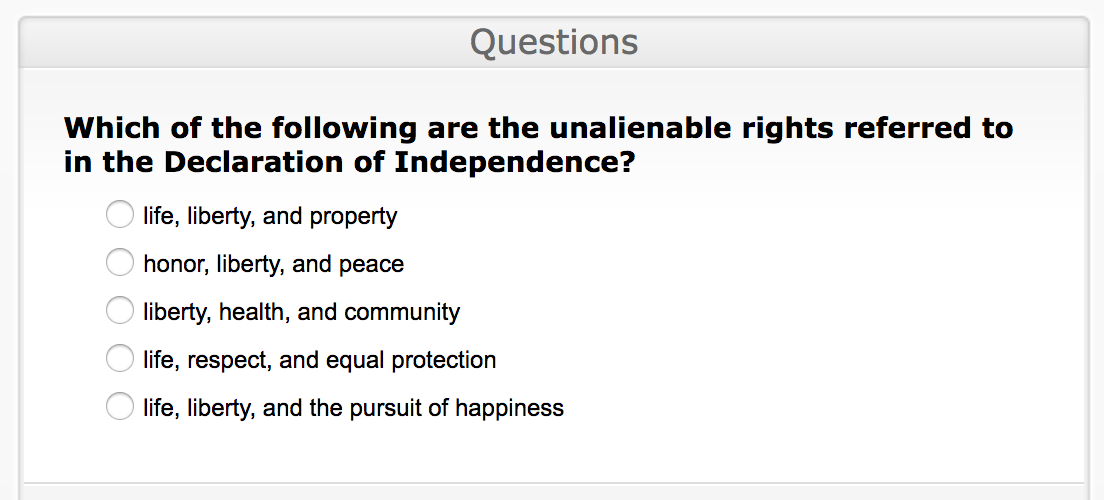I was reading a Hal Crowther‘s article on how America is losing its conscience, brain, and heart when I noted mention of a study by the National Civic Literacy Board. A few Googly-seconds later I wound up at the Civics Quiz, a 33-question online assessment taken from the 2008 Civic Literacy Exam developed by the conservative Intercollegiate Studies Institute (ISI).
I couldn’t resist.
Before taking the quiz, I was intrigued to learn that the average score for all 2,508 Americans who took it in 2008 was 49 percent. For college educators the average jumped – by a whopping 6 points – to 55 percent. Yikes! What questions were being asked, and what were the chances I would fare any better?
As it turns out, the questions seemed mostly reasonable, and I did do quite a bit better than the 2008 average (though I definitely did not ace the quiz). That got me thinking about why I did better as well as about the value of these types of quizzes.
As for why, I’m certain one key reason is simply that I care. I’m sure I picked up some of the factual knowledge tested by the quiz during my schools days, but much of it I know or have retained because I have been involved in a variety of civic activities – from politics to volunteering for nonprofit organizations – since college. My content knowledge is a reflection of experience, motivation, and engagement. (A view the ISI’s nemesis, John Dewey, would have supported.) The history of my coming to have this knowledge – of my learning – is essentially a history of how I came to care.
The flip side of the coin – and part of the reason these types of quizzes have some limited value, in my opinion – is that the lack of content knowledge is often evidence of a lack of engagement, or at least a lack of thoughtful engagement. It doesn’t strike me as too much of a stretch to suggest that people who care about the effective functioning of our democracy should possess some basic knowledge of its history, major concepts, and founding principles. By that measure, the ISI has some grounds for sounding the alarm. And so do all the folks who are bemoaning our lack of content knowledge in any number of other areas.
But, of course, content does not equal engagement, and neither content nor engagement is sufficient in and of itself for “literacy,” in my opinion. A person could ace this quiz and be declared civically “literate” while doing nothing to contribute positively to civic life (and, of course, remaining entirely ignorant of other areas of civic knowledge not tested by the quiz).
Likewise, there are plenty of ways to engage in civic life without mastering the types of content covered by the quiz. Many of these forms of engagement are entirely positive, but as Crowther’s suggests in his article, many are not.
In general, I’d say tools like the Civics Quiz have a place in gauging broader societal issues so long as they are recognized as only one tool among many and plenty of critical thinking skills are brought to bear in using them. On the other hand, they can be quite useful in measuring your knowledge as an individual learner and potentially setting some personal learning goals. What do you think?
Jeff






Stephen – Well, you beat me. I got 29/33 – and the Roosevelt/Supreme Court and Puritan questions were two of the ones I missed. Embarrassed to say I have already forgotten what the other two were. I guess I need to take it again! Thanks for sharing your score. – Jeff
(and I’m comforted by the fact that these questions were just things I didn’t know, and never knew, not stuff I once knew but had forgotten).
I got 31/33 — which is pretty good for a non-citizen.
I didn’t know: In 1935 and 1936 the Supreme Court declared that important parts of the New Deal were unconstitutional. President Roosevelt responded by threatening to: answer: appoint additional judges who share his views.
And: The Puritans: stressed the sinfulness of all humanity. (I picked ‘opposed war’, which I think was also true, but who knew…?)